Discovering Unique Avian Companions for Pet Lovers
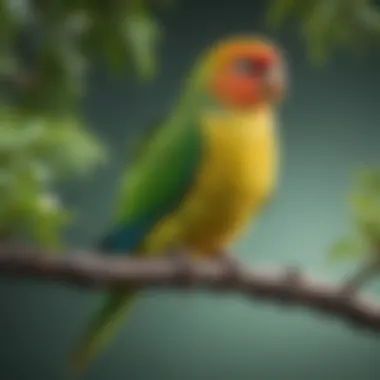
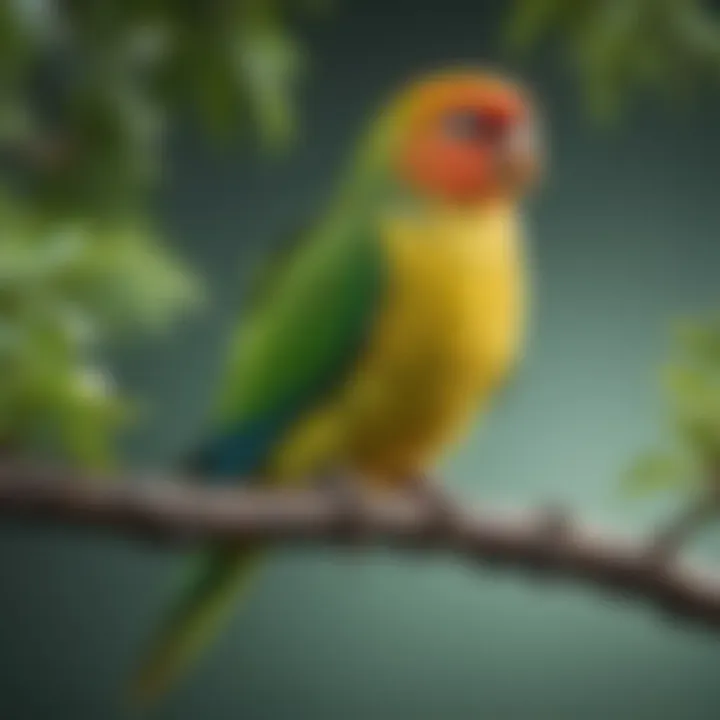
Intro
When it comes to choosing a pet, many people think of cats or dogs. However, birds can make wonderful companions as well. Recently, folks have started looking beyond popular parakeets or cockatiels to discover a whole world of unique avian companions. This shift in thinking is catching on, and for good reason. With diverse species available, these alternative birds offer a variety of personalities, care needs, and emotional perks that can fit different lifestyles perfectly.
The beauty of avian companionship lies in its richness—the vibrant colors, the melodious songs, and the fascinating behaviors. But before diving into the intricacies of specific species, it’s essential to grasp fundamental concepts related to bird care, interaction, and well-being. This article aims to equip both novice and experienced bird owners with necessary knowledge, while also stirring up interest in lesser-known birds suited for companionship.
Let’s start by discussing the foundational elements needed for caring for these feathered friends.
Avian Care Basics
Taking care of a bird is different from other pets. Each species has its own set of needs that can be quite distinct from another. Here, we will cover essential aspects to help set the stage for happy and healthy birds.
Importance of Proper Nutrition
Just like humans, birds require a balanced diet to thrive. It’s crucial to understand that not all birds eat the same thing. For instance, a cockatoo will have different dietary requirements compared to a lovebird. Plenty of commercial pellet feeds cater to specific species, but fresh fruits and veggies can also make a delightful addition! Some key foods include:
- Leafy greens like kale and spinach
- Fruits such as apples, bananas, and berries
- High-quality seeds or nuts in moderation
By ensuring a well-rounded diet, bird owners can prevent issues like obesity or malnutrition.
Understanding Bird Species and Their Needs
Every bird species carries unique traits, behavioral patterns, and care needs. Whether you're considering a budgerigar or a parrotlet, understanding the specifics can make a world of difference. Take time to research:
- Size: Larger birds generally need more space.
- Lifespan: Some birds can live for decades, requiring long-term commitment.
- Social behavior: Some species thrive on interaction, while others prefer solitude.
Basics of Birds Habitat Setup
Creating the right habitat is essential. Birds need adequate space to fly, play, and explore. A suitable cage, complete with perches, toys, and a designated eating area, is vital. The cage should be spacious enough to allow for wing-flapping and movement. Perhaps don’t forget to ensure that the environment is safe from household hazards.
Grooming and Hygiene Tips
Grooming goes hand-in-hand with health. Regular beak, nail, and feather care helps keep your bird in top shape. Bathing is not just for show—clean feathers help birds regulate their body temperature. Regular check-ups are pivotal to avoid the risk of unnoticed ailments.
Interacting with Your Pet Bird
Building a strong bond with your feathered friend is rewarding but requires patience and understanding. To cultivate that connection, communication and interaction play significant roles.
Building Trust and Connection
It won’t happen overnight, but with gentle persistence, trust can blossom. Start by spending time near their cage, talking softly. Offering treats helps build a positive association. Giving space when needed is also key.
Training Techniques and Tips
Birds are incredibly intelligent and can learn various tricks or commands. Using positive reinforcement, like treats or praise, is highly effective. For example, teaching a bird to step up onto your finger can be a gratifying experience.
Fun Activities for Bird Owners and Their Birds
Engagement doesn’t have to be a chore, nor should it be routine. Offer toys that challenge them mentally, and explore playful activities. For example, some birds enjoy hide-and-seek by covering their eyes with a wing!
Recognizing Bird Cues and Behaviors
Understanding your pet's body language is essential. Birds can’t verbally express their feelings, but movements can speak volumes. Watch for signs of contentment, like preening, or stress, such as excessive flapping or biting.
Emotional Well-Being of Birds
The emotional aspect shouldn't be overlooked. Birds thrive when they feel safe and stimulated, similar to humans.
The Role of Play and Socialization
Engaging in playtime is fundamental for bird happiness. It keeps their minds active and spirits high. Social birds can flourish through interaction, turning mundane days into exciting adventures.
Enhancing Birds' Emotional Health
Offering varied activities and companionship can enhance emotional well-being. Explore introducing birds to one another when safe, but always ensure they have individual attention too.
Assessing Bird Stress and Remedies
Stress can be a silent enemy. Be alert to environmental changes or sudden shifts in routine—these can affect your bird’s mood. Sometimes, simple adjustments in their environment can make a difference.
Building Strong Human-Bird Bonds
Invest time and effort into understanding your avian companion's personality. This investment pays off in the form of a profound bond that can last a lifetime. It forms the bedrock of a fruitful companionable relationship.
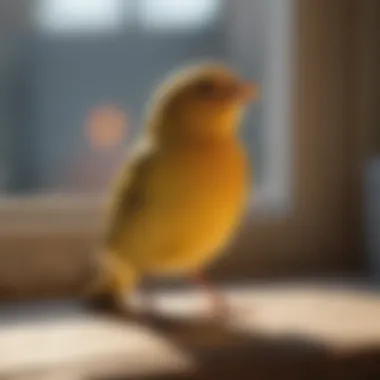
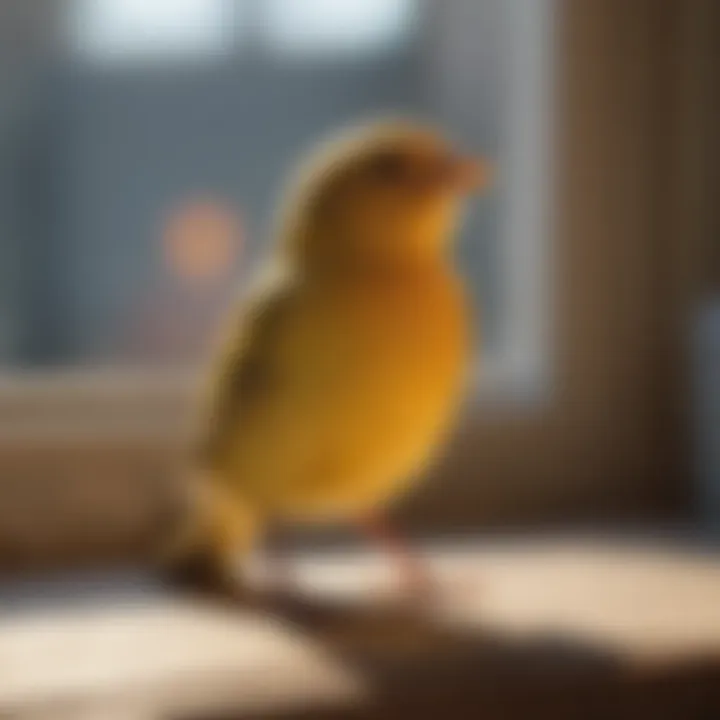
Bird Health and Safety
Keeping birds healthy is as essential as providing companionship. Health understanding goes a long way in ensuring a long and happy life.
Common Health Issues and Prevention
Birds can fall prey to a slew of health problems, much like any pet. It's vital to familiarize yourself with the common ones, like feather plucking or respiratory issues. Understanding early signs can often lead to prompt treatment.
Routine Veterinary Care
Regular veterinary visits are non-negotiable. Finding an avian vet who is knowledgeable about different species shows dedication to your bird’s well-being.
Environmental Hazards to Avoid
Be mindful of potential dangers, such as toxic plants, drafts, and sharp objects, as these can be harmful. Even household items like non-stick cookware can release toxins harmful to birds.
Signs of Illness or Distress
It's essential to be proactive. Unusual behavior, changes in appetite, or feather loss warrant a closer look. Addressing health issues early makes a significant difference.
Fun Facts and Quirky Insights
Birds have a rich history and are fascinating creatures to learn about.
Unique Traits of Popular Bird Species
Did you know that African Grey parrots possess incredible mimicking capabilities? They can imitate human speech with surprising accuracy!
Historical and Cultural Significance of Birds
Throughout history, birds have held symbolic significance in various cultures, representing freedom, hope, and wisdom. For instance, in ancient Egypt, the ibis was revered as a sacred symbol.
Famous Bird Owners and Their Stories
Take a look at social media, and one might discover a community of bird lovers, including celebrities showcasing their avian friends. Each bond tells a unique story worth exploring!
Birds bring joy, companionship, and a piece of nature right into our homes. Understanding them layers a bond that transcends words.
Intro to Avian Companionship
In recent years, the realm of pet ownership has seen shifts in preferences, with an increasing number of individuals and families looking for alternative companions to the typical cats and dogs. Among these growing interests are pet birds, creatures that bring not only color and charm to our homes but also a unique bond and connection that can sometimes surpass interactions with other pets.
Birds have a remarkable way of carving out their niche in our hearts, often becoming integral members of the family. Their ability to mimic human speech and their lively personalities make them fascinating companions. However, many people tend to stick with popular species, like parakeets or cockatiels, often overlooking a world of unique avian companions that can offer just as much—or even more—fulfillment.
The Appeal of Pet Birds
Pet birds can truly offer a different kind of companionship. For instance, unlike some pets that might need constant attention, many birds are content to sit quietly on a perch, observing their surroundings while providing a sense of tranquility in the home. This characteristic can be particularly attractive to those who live busy lives but still desire the joy of having a lively presence around.
Moreover, the variety among birds is astounding. With options ranging from small finches to larger parrots, owners can pick and choose a bird that fits their lifestyle and space constraints. Whether you have a tiny apartment or a spacious house, there’s an avian friend ready to be a part of it.
Rethinking Traditional Choices
It’s time to expand our horizons when it comes to avian companionship. The classic choices of birds often fail to highlight the fascinating traits found in less conventional species. For example, while many instantly think of a parrot, there are equally intelligent doves, or delightful canaries, which possess their own unique temperaments and quirks. Each species has distinct care requirements and characteristics that contribute to different companionship experiences.
Choosing a bird that falls outside traditional favorites can lead to discovering novel aspects of avian care and behavior that are often overlooked. It's all about embracing diversity, not just in feathered friends but in the relationships we build with them.
As you explore the world of avian companionship, consider not just the immediate appeal but also the potential joys of bonding with a less typical bird species. This exploration can lead to discovering meaningful and enriching connections that might just transform your understanding of pet ownership.
Understanding Alternative Bird Species
Understanding alternative bird species expands our horizons in the realm of avian companionship. Often, when people think about pet birds, the usual options like parrots, canaries, and finches readily come to mind. However, diving deeper into the diverse alternatives can reveal profoundly unique companions that fit various lifestyles and preferences.
The Benefits of Considering Alternatives
The importance of recognizing different bird species is multifold. For one, choosing an alternative can lead to healthier emotional bonds. Not every bird species shares the same personality traits or social needs. For an owner interested in a quieter yet affectionate bird, selecting a less common option might just bring joy and satisfaction in unexpected ways. From a practical standpoint, some lesser-known birds are easier to care for and might not require the same level of attention as their more popular relatives.
It's crucial to consider distinct avian needs regarding habitat, socialization, and care requirements. Not all birds thrive in similar environments — a fact that makes understanding these species pivotal for potential bird owners.
Parrots: Beyond the Common Varieties
Parrots often steal the spotlight, but there are countless varieties out there. The charming Budgerigar, or Budgie as many call it, is one such example. However, many might overlook other parrot species, such as the Lovebird or the Cockatiel. These smaller parrot types can offer personality attributes that rival their larger cousins, yet their care requirements might be less stringent.
For instance, Lovebirds are known for their affectionate nature. They tend to bond closely with their owners and other birds. However, despite their small size, they boast bold personalities. Owning a Lovebird means preparing for plenty of play, as they are mischievous critters that thrive on interaction.
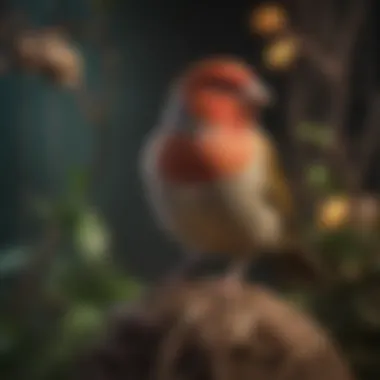
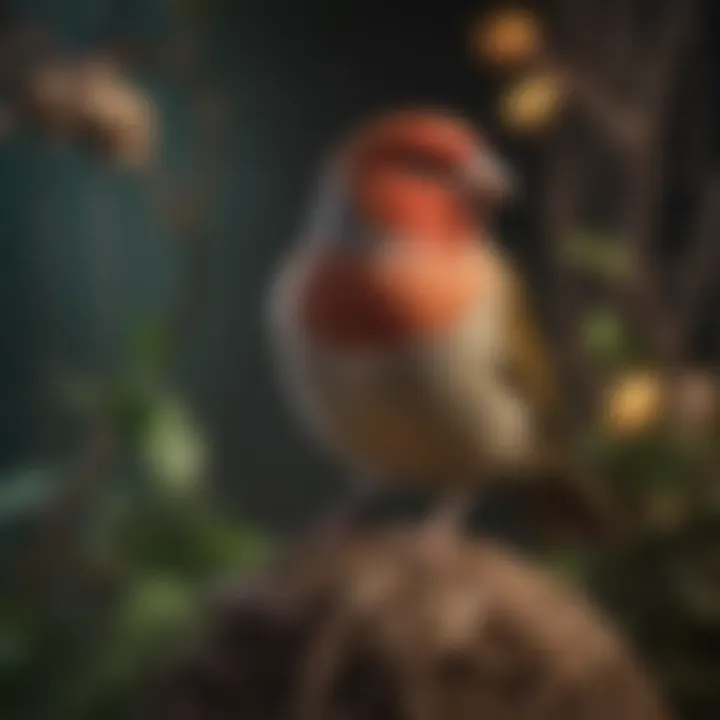
Canaries: Unique in Their Own Right
Many know canaries for their melodious songs and vibrant colors, but their allure goes beyond just looks. For individuals seeking a calm and soothing presence, Gloster Canaries or Hartzig Canaries can be lovely choices. These gentle creatures sing sweet melodies and can fill your space with a serene ambiance.
Remember, even within common species like canaries, there exists undeniable variety. Each type has distinctive features and behaviors, providing unique companionship experiences. For instance, some canaries may be more social, while others prefer solitude.
Finches: Small Birds, Big Personalities
Finches are often an underestimated choice when considering pet birds. Characteristically, these small birds possess vibrant colors. Finches can be kept in groups and, believe it or not, they thrive on social interactions with their kind as well as with humans. The Zebra Finch, known for its unique markings and cheerful chirps, is an excellent example of how much personality can be packed into a small avian package.
Keeping finches can result in a lively environment, as they often display playful behavior. It’s crucial to house them in pairs or groups since these birds flourish in social settings. These charming birds can light up a room without needing excessive attention from their owners.
Doves and Pigeons: Gentle Companions
When one thinks of pet birds, doves and pigeons may not come first to mind, but these gentle souls have much to offer. Homing Pigeons are particularly fascinating; their impressive navigation skills and ability to bond closely with their owners serve as captivating points. Similarly, Mourning Doves have a quiet nature that can complement a peaceful home environment.
They are often considered low-maintenance pets, requiring relatively simple care yet providing rich companionship. Doves display affection in their unique ways, often choosing to curl up next to their owners or engage in gentle cooing sounds that can be surprisingly comforting.
Exotic Birds: The Lesser-Known Choices
While many flock to the typical types of pet birds, exploring the exotic varieties offers unique surprises. Birds like the Tocos Toucan or the Green-Winged Macaw boast remarkable beauty and astonishing traits.
However, owning an exotic bird brings forth distinct considerations, such as specialized diets or more interactive environmental needs. These birds usually need more attention and care, making them ideal for dedicated(but not overly experienced) owners.
In essence, diving into the world of alternative bird species unveils an array of options catering to diverse interests and lifestyles. Whether it’s the affectionate nature of doves, the singing of canaries, or the playful finches, each bird offers a critical perspective in understanding avian companionship.
Care Requirements for Unique Avian Pets
Caring for a pet bird goes beyond just providing food and water; it’s about creating a nurturing environment that supports their health and well-being. Each bird species comes with its own set of needs, which makes knowing how to properly care for them crucial. Understanding care requirements for unique avian pets ensures that these fascinating creatures thrive in a domestic setting. It not only enhances their quality of life but also strengthens the emotional bonds shared between birds and their owners.
When considering a unique bird as a companion, one should be prepared for the responsibilities that come along. A failure to meet these needs can lead to health issues, unwanted behaviors, and even a shortened lifespan. This section dives into three fundamental aspects of care: dietary needs, habitat setup, and socialization. Each component plays a vital role in forming a holistic approach to bird ownership.
Dietary Needs: Nutrition for Various Species
To put it simply, birds are what they eat, and this rings especially true for unique avian companions. Dietary needs can drastically differ between species, and providing the right nutrition is the backbone of avian care. Just like how humans can’t thrive on the same meal every day, neither can birds.
Birds should have a diet that incorporates a range of foods. For instance, seed diets may be popular among pet owners, but many species require more balanced nutrition. Notable food groups to consider include:
- Pellets: A complete diet option for many birds, providing balanced nutrition.
- Fruits and Vegetables: Fresh produce like carrots, spinach, or apples brings variety and essential vitamins.
- Seeds and Nuts: While many birds enjoy seeds, they should be given as treats and not be the mainstay.
- Grains: Cooked whole grains can serve as great additions for certain species.
Understanding what your bird needs specifically is key. Researching their species or consulting with a veterinarian can provide clarity on dietary requirements.
Habitat Setup: Tailoring Environments
Creating a suitable habitat is like setting the stage for a play—every detail matters. The right environment not only keeps birds comfortable but also encourages natural behaviors.
A few essential considerations for habitat setup include:
- Cage Size and Type: A larger cage is often better, allowing for movement and play. Birds need to stretch their wings and explore!
- Perches and Toys: Varying materials and heights for perches is needed to keep their feet healthy. Toys prevent boredom.
- Safe Space for Flight: If possible, designate a room where birds can fly safely. This helps promote physical health and mental well-being.
The overall habitat should be a reflection of the bird’s natural environment, allowing them to exhibit instinctual behaviors.
Socialization: Fostering Connections
Birds are social creatures that thrive on interaction. Just like you wouldn’t want to sit alone at a party, these avian companions desire companionship. Socialization is not only beneficial for your bird but also enhances your connection with them.
Here are some socialization strategies:
- Daily Time Out of their Cage: Regular out-of-cage time helps build trust and allows birds to explore.
- Gentle Handling: Approach your bird slowly and ensure they feel secure during interactions.
- Interactive Play: Use toys or engage them in activities to stimulate their minds.
"Birds are not just pets; they can become family members. Connecting with them fosters both emotional growth and happiness."
Behavioral Insights of Alternative Birds
Understanding the behavior of alternative bird species is crucial for several reasons. These insights deepen our appreciation for the unique traits these birds present, and they help potential bird owners align their lifestyles with the needs of their new companions. In exploring behavioral patterns, we can also glean important lessons on how to create an optimal living environment and foster a strong bond with our feathered friends. By recognizing what makes alternative birds tick, we pave the way for a rewarding experience—both for the pet and the owner.
Understanding Avian Behavior
Birds, unlike cats or dogs, exhibit behaviors that range from social interaction to territoriality in diverse ways, influenced by their species-specific traits. Observing a bird's habits can be a telling way to understand its needs. For instance, certain species thrive in social settings and may feel lonely or stressed if left alone for long periods. Conversely, many finches can be quite independent, enjoying the serenity of their space.
Furthermore, understanding behavioral nuances is key to positive engagement. For example, budgerigars, often called "budgies," show playful and curious behavior. They might enjoy playing with toys or even interacting with their humans through mimicry or chatting. In contrast, a dove may exhibit gentler, more subdued habits, preferring a quieter environment and leisurely interactions.
"Birds have the innate ability to respond to their environments more than we sometimes give them credit for—knowing what makes them tick can transform your living space into a sanctuary for them."
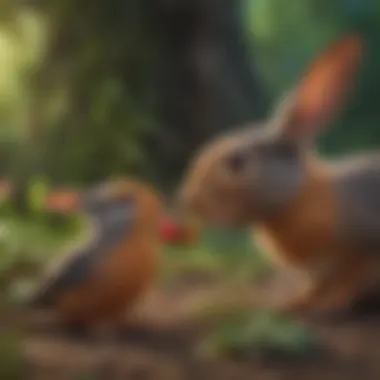
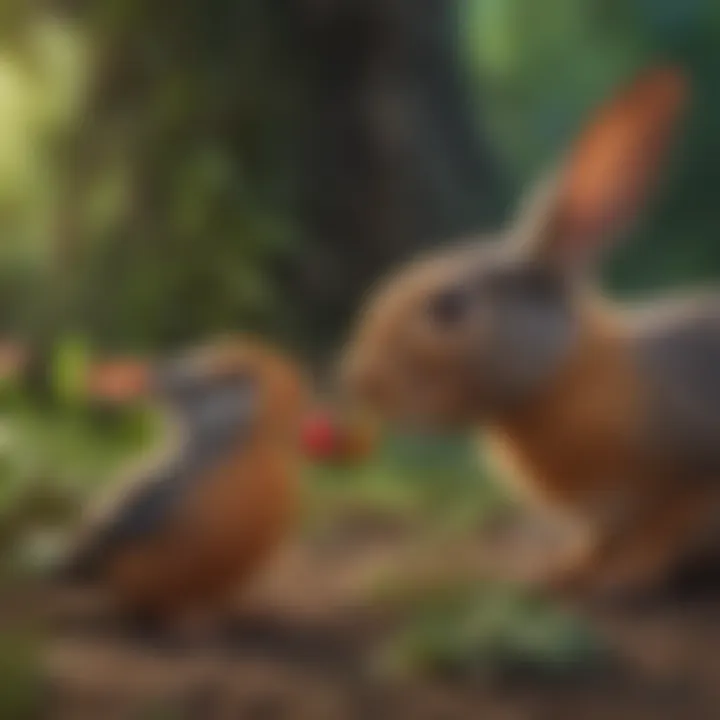
Communication: The Language of Birds
Bird communication can be seen as a fascinating dance of sounds and movements. Each species possesses its own unique set of calls and body language, which serve as a vital means of expressing needs, emotions, and even distress.
For instance, lovebirds are often very vocal, chirping away to assert their presence or seek companionship. Listening closely to these calls can help owners gauge their mood or comfort level. Alternatively, conures may boast loud and boisterous calls, reflecting their vibrant personalities while also alerting their owners to changes in the environment.
On the flip side, some birds use subtlety to convey their messages. A cockatiel may tilt its head or puff up its feathers, subtly signaling a desire for attention or play. Recognizing these signals is vital in ensuring your bird feels seen and understood.
To communicate effectively with your avian companions, try to mirror their behavior or vocalizations. This reciprocal action reinforces bonds and makes your feathered friends feel valued. Keeping an eye out for specific cues can also help in understanding their distress and needs without having to resort to trial and error.
By understanding both avian behavior and communication, you're not just cohabitating with a pet; you are cultivating a relationship defined by trust and empathy. This holistic approach to avian companionship will enrich your experience and ensure mutual enjoyment.
Advantages of Choosing Non-Traditional Birds
When it comes to selecting a pet bird, most folks think of the usual suspects: parakeets, canaries, or maybe a parrot if they’re feeling fancy. Yet, there’s a world of avian companions beyond these mainstream choices that could enrich your life in ways you might not expect. Opting for non-traditional birds opens up a spectrum of unique experiences and rewards.
Owning an alternative avian friend can be a transformative relationship that balances companionship with the quirks of individual species. You might find that these birds possess characteristics that align better with your lifestyle, or perhaps they catch your eye with vibrant plumage and intriguing behaviors you've not seen before. Let's explore some of the standout benefits of broadening your avian family.
Diversifying Your Avian Family
Bringing a range of bird species into your home can elevate your experience as a bird owner. For instance, species like the Cockatiel or Lovebird tend to have distinct social dynamics and behaviors. Not only do they come with unique looks and sounds, but they also offer varying levels of interaction that fit different moods and routines.
- Strengthening Bonds: Each species has varied ways of expressing affection and social grooming. A dove, known for its soft coos and gentle demeanor, might lend a calming influence to your daily life, while a finch’s lively movements brings energy and entertainment.
- Capacity for Adaptation: Non-traditional birds are often more adaptable to different living environments. For example, some smaller birds can thrive in a cozy apartment, needing minimal space yet providing lively companionship. You don’t necessarily need a sprawling aviary to ensure that these birds enjoy a happy existence.
- Appreciating Diversity: Understanding and witnessing the differences in behavior and personality across various species can create an enriching learning experience. You learn not just about your pet, but develop a broader appreciation for avian life.
Companionship Dynamics
Every bird species brings its own flavor to companionship—some may be the life of the party, while others prefer a quieter existence. This diversity influences how you interact with them as owners. Different birds can teach valuable lessons about patience, care, and communication. Here are a few dynamics to consider:
- Socialization Opportunities: Birds like the Budgerigar are social butterflies. They thrive on interaction not just with their human companions but also with other birds. This fosters a vibrant home life that can be both enriching for you and nurturing for your avian friends.
- Understanding Their Needs: Owning a non-traditional bird means you’re likely to learn more about tailor-made care. For example, African Grey parrots, although common among some owners, have personalities that demand unique forms of engagement and mental stimulation, making the caretaking experience rewarding every day.
- Connection Beyond Words: Birds communicate in ways that are sometimes more intuitive than verbal. Understanding body language—like wing flutters or head tilts—creates a deeper bond. Your ability to interpret these signs enriches your relationship, making every moment spent together more satisfying.
"Choosing a non-traditional avian companion could be the key to discovering an unexpected friendship that fills your days with wonder and soft songs."
Through thoughtful consideration and commitment, diversifying your avian family could yield not just unique pets, but beloved companions that resonate with your spirit.
Nurturing Unique Avian Relationships
Creating a deep connection with a pet bird goes beyond just feeding it and cleaning its cage. When we talk about nurturing unique avian relationships, we’re diving into the aspects that help transform a simple pet-owner dynamic into a fulfilling companionship filled with joy and trust. Each bird, with its specific quirks and traits, brings a distinct vibe to the home and forming a bond with such a creature can be a rewarding experience. This section delves into the strategies and engaging activities that can help foster this bond while also enhancing the well-being of these feathered friends.
Bonding Strategies for Owners
The relationship you build with your avian companion can profoundly affect its behavior and happiness. It’s essential to realize that building this bond takes time, patience, and consistent effort. Here are some effective strategies for bird owners to bond better with their pets:
- Creating a Safe Space: Establish an environment where your bird feels secure. Using familiar toys and perches can provide comfort and lead to positive experiences when interacting with you.
- Consistency is Key: Just like humans, birds thrive on routine. Set a schedule for feeding, playtime, and interactions. This predictability creates a sense of security for your pet, which is fundamental to building trust.
- Gentle Handling: Start with simple, gentle interactions. Allow your bird to explore your hand at its own pace. This encourages curiosity and diminishes fear. Once it feels comfortable, you can gradually begin more interactive handling.
"The key to understanding your bird's needs is to observe its body language, which speaks volumes more than words can."
- Vocal Interaction: Talk to your bird regularly, using a calm voice. Birds, like cockatiels and budgerigars, often respond to their owner's tones and can even mimic speech over time. Singing or whistling also stimulates their natural behavior.
- Rewards and Treats: Use positive reinforcement to encourage behaviors you want to see more of. Offering your bird a favorite treat when it approaches you or lets you handle it will help cement a positive association with bonding activities.
By incorporating these methods into your daily interactions, you are laying the groundwork for a mutual bond filled with respect and affection.
Interactive Activities to Engage Birds
Birds are intelligent creatures that need mental stimulation and physical engagement to thrive. Interactive activities not only entertain your feathered companions, but they also go a long way in reinforcing the bond between you and your bird. Here are several ideas:
- Toys and Puzzles: Invest in toys that challenge your bird mentally. Toys that dispense treats or require manipulation can keep your bird engaged and promote problem-solving skills.
- Flight Time: If your living space allows, let your bird fly around safely. Supervised flight time offers great exercise and, at the same time, strengthens your bond as it seeks you out for safety.
- Training Sessions: Teaching your bird tricks can be fun for both of you. Start with simple commands like "step-up" or use clicker training to reinforce positive behaviors. Training exercises serve as mental enrichment while building trust between you.
- Bath Time: Many birds enjoy bathing, either in a shallow dish or misting with water. This not only keeps them clean but can be a bonding session that culminates in shared joy.
- Outdoor Exploration: For those in safe locations, taking your bird outdoors can be a delightful experience. They often respond positively to the novel sights and sounds, all while feeling secure on your shoulder or in a bird-safe carrier.
Nurturing unique avian relationships is not just about the joy of companionship; it's about understanding your bird's needs and preferences while giving it the attention and care it deserves. By putting these strategies and activities into practice, you elevate not only your bird's quality of life but enrich your own as well.
End: A World of Possibilities
The realm of avian companionship has expanded beyond the well-trodden paths of classic pet birds. This article elucidates the charm and value of choosing unique avian companions that might not immediately spring to mind for prospective bird owners. Each alternative bird species has its own distinct qualities, habits, and quirks, which contribute to an enriched experience as a pet parent. With this diversity comes a greater understanding of what it truly means to bond with an animal that represents a different experience in caretaking and companionship.
In realizing the potential of these lesser-known birds, we open ourselves to a broader perspective on what it means to share our lives with another creature. The often-overlooked species, such as doves, canaries, or even exotic birds, offer not just companionship but also an opportunity for personal growth and emotional engagement. When you embrace unique avian companions, you are not just adding a pet; you are inviting a distinctive character and energy into your home.
Adopting these birds requires consideration—diet, habitat, and social interaction are paramount to ensure their well-being. Yet, the benefits are well worth the effort. Not only do these pets offer companionship, but they also help develop patience and understanding in their owners.
"The greatest gift of a bird is its ability to be a natural communicator, effortlessly bridging the gap between species, teaching us to appreciate the subtleties of life’s interactions."
When the heart is open to alternative birds, a wide spectrum of experiences unfolds. Whether it's the melodic tunes of a canary or the gentle coo of a pigeon, the sounds of your home can transform. This article has aimed to inspire pet bird owners and aspiring bird parents to reconsider their options—to explore, to experience, and to cherish what unique avian companions can offer.
Embracing Unique Avian Companions
Choosing to welcome unique avian companions into your life goes beyond the act of pet ownership. It's an opportunity to embrace the unexpected. These birds can be playful, affectionate, and sometimes surprisingly entertaining, adding a dynamic flair to daily life. For those who thrive on novelty and appreciate diversity in their experiences, these uncommon birds serve as an ideal counterpart. Not only do they break the monotony often associated with traditional pet choices, but they also teach invaluable lessons in empathy and commitment.
When considering a unique avian pet, it’s essential to engage in adequate research. Understand their natural behaviors, potential health concerns, and specific needs—ingredients that create a recipe for a fulfilling relationship. Connecting with like-minded individuals through platforms like reddit.com or specialized Facebook groups can provide practical insights and camaraderie. As a future bird owner, being part of a supportive community enhances your journey, guiding you through the optimistic, and sometimes challenging, waters of avian companionship.
Final Thoughts on Avian Diversity
The stunning diversity found in the world of birds is often overlooked. Every bird species comes with an enchanting array of traits, colors, and songs that can satisfy any aesthetic or emotional preference. By broadening our scope, we can appreciate what each bird brings to our daily lives.
As you reflect on these possibilities, remember that each bird has its story, and countless friendships await discovery. Whether you find joy in the vibrant plumage of a finch or the soothing presence of a dove, the journey into avian diversity is an adventure worth taking. Let's honor and nurture these relationships. By investing time and love into alternative bird species, we become part of a movement that celebrates the unique bonds we forge with our feathered friends.















